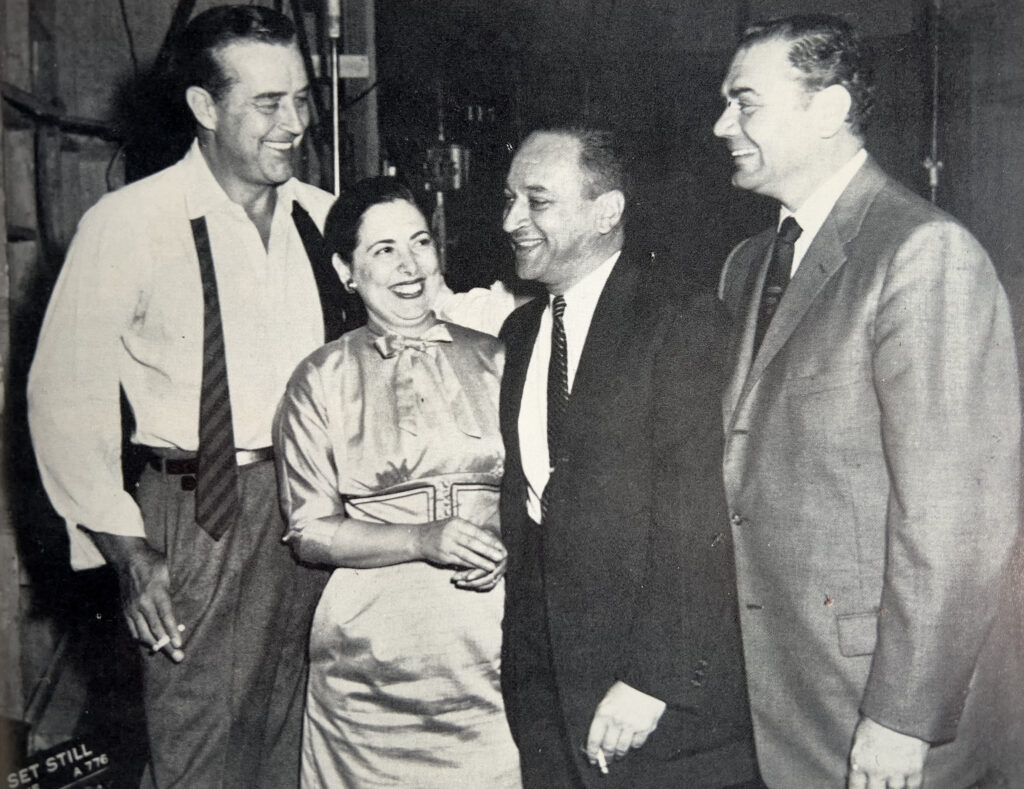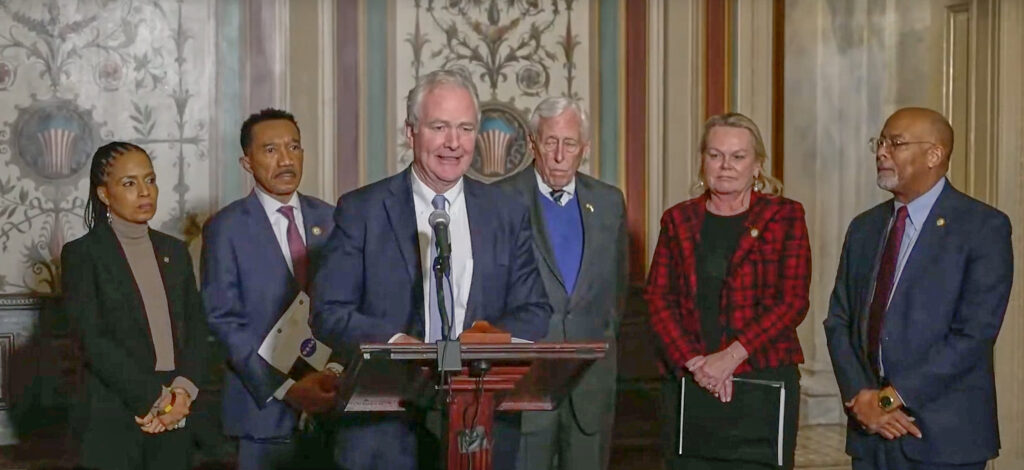The five-volume set of transcripts for the McCarthy hearings of 1953-1954 were kept sealed for 50 years. They are now available online at https://www.senate.gov/about/powers-procedures/investigations/mccarthy-and-army-mccarthy-hearings.htm. Two prominent Greenbelters, Abraham Chasanow and Sherwood East, were among the casualties of McCarthy and his henchmen’s hearings. This is the first of a two-part series about Chasanow and East.
“You say you never have heard the claim or accusation made that there is a group of Communists at Greenbelt?”
This question was put to Greenbelt resident Abraham Chasanow by the infamous Wisconsin Senator Joseph R. McCarthy at a hearing on November 3, 1953. Chasanow was a prominent Greenbelt resident at the time. He was employed by the U.S. Navy Hydrographic Office for 23 years when he was suspended without pay on July 29, 1953, as a security risk because unidentified informants accused him of left-wing associations. His charges included a suspicion of associating with people who have communist tendencies, attending a party where funds were raised for victims of the Spanish Civil War and for being a leader and active member of a Greenbelt radical group. He was eventually exonerated in May of 1954 and a movie, Three Brave Men, was made about his experience in 1957. In Time’s May 10, 1954, article The Administration: The Greenbelt Mystery, they reported “Chasanow had 97 character affidavits supplied by friends and associates, and ranging from admirals to the Greenbelt postman.” Another Greenbelt resident was suspended from his job at the Hydrographic Office, reports the Time article, charged with criticizing the American Legion and advocating Bible-burning at a 1943 Greenbelt meeting, among other things. Time reported: “Statistics of Hydrographic Office security cases showed a disturbing fact: the office had 13 employees who lived in Greenbelt. Five of them had been suspended as security risks. All the suspended men, but none of the others, were Jewish. (Greenbelt is about 8% Jewish). In Greenbelt, where most of the residents are government workers, the suspensions cast a pall of fear and dismay.”
On September 1, 1954, Assistant Secretary of the Navy James Smith apologized to Chasanow and reinstated him as an employee, saying that a great injustice had been done by the informants who had accused him and that the hearing board had found him to be “an above average loyal American citizen.”
The Red Scare
McCarthy was a junior senator from Wisconsin who in 1950 claimed to possess lists of card-carrying Communists employed by the federal government. In the early 1950s Americans were repeatedly told by their leaders to be fearful of subversive Communist influences in their lives. Communists could be lurking anywhere and this paranoia about the internal threat posed by Communism was called the Red Scare. McCarthy, a right-wing Republican, used this paranoia to persecute and ostracize citizens. As chairman of the Senate Permanent Investigation Subcommittee, he held hearings to weed out Communist infiltrators, sympathizers and associates based on rumor and inuendo leading to a nationwide general fear of the “Communist menace.” This resulted in the destruction of many lives and careers of liberal-leaning persons. Lead Counsel Roy Cohn (a friend and mentor to Donald Trump) was a close associate of McCarthy and conducted the questioning when the senator did not assume that role.
Greenbelt residents came under special scrutiny as left-leaning because the city was built by President Franklin Roosevelt’s New Deal and promoted cooperativism, community engagement and free thinking with lively debate. The Greenbelt Cooperator wrote on April 22, 1954, “… for those who live here [the implication] is that Greenbelt is a hotbed of left-wing radicals or worse. Newcomers may be wondering if they have unwittingly settled in a nest of subversives.” The author is not aware of any Greenbelt resident ever being found to have been disloyal to our country, while many worked night and day to support the World War II war effort.
Transcripts
Selected excerpts from the hearings
CHAIRMAN: “Is it general knowledge at Greenbelt that there is a small group of Communists out there?”
CHASANOW: “No, sir.”
CHAIRMAN: “You say you never have heard the claim or accusation made that there is a group of Communists at Greenbelt?”
CHASANOW: “No, sir, I do not recall it.”
CHAIRMAN: “We are dealing with a very important matter. We have the testimony of any number of witnesses that there is an espionage ring working within our Signal Corps laboratories. If that is true, it means this country is in considerable danger; it means the Russians have our top most secrets concerning our radar, our radar changes and electrical equipment, almost everything. You have been handling that secret material in one branch of the government. You have had security clearance. You have been living where a great number of witnesses tell us there are hard core Communist organizations and I just wonder if you yourself could shed any light about that. You are not here as a defendant. You are here to be of help to the committee and try to give us information.”
CHASANOW:
“I want to be of as much help as I can. Honestly, Senator, if there has been that, they have certainly steered clear of me. They have not said anything in my presence. I know personally no one who ever said anything in my presence to indicate he was a Communist.”
Cohn would question individuals during the hearings and could be heard on the transcripts asking Chasanow about his employment and the grounds for his suspension. Cohn grilled Chasanow about who his friends and associates were, his attendance at a party in Greenbelt to raise money for a Spanish aid group. Chasanow admitted to subscribing to In Fact, what Cohn called “a Communist newsletter.” Chasanow said he had subscribed for one year, saying, “… it was a cheap little newspaper and after reading it I found that I did not agree with what they said and I threw it in the wastebasket.” (In Fact was a weekly newsletter attacking corporate malfeasance, the FBI and the cigarette industry; see wikipedia.org/wiki/George_Seldes).
Sherrod East
McCarthy was not, in fact, after Chasanow at the 1953 closed-door hearing. The purpose of that hearing was to tarnish an Army employee, former Greenbelt resident Sherrod East, by connecting him with the discredited Chasanow. Both Chasanow and East had been active in many Greenbelt organizations and had served on boards and committees together. They were both involved in organizing the cooperative that purchased most of the city’s original housing when the federal government sold Greenbelt in 1953.
McCarthy’s Fall
The atmosphere that these hearings bred was permeated by fear and distrust, threatening civic engagement. One might think twice before expressing an opinion or stay away from public activities to not be accused of associating with the “wrong people.” McCarthy’s fall from grace began in 1954 when he turned his investigations against members of Eisenhower’s administration. Administration officials began to discredit McCarthy and the men around him such as Cohn, who was known to use threats and intimidation against his perceived enemies. McCarthy’s credibility was shredded and the Senate passed a motion to condemn him, in December of 1954.
Impact on Greenbelt
The fallout from this period in our history had a profound impact on families in Greenbelt. “My father, Howard Kash, was cleared at his loyalty hearing, but was made to understand he should not expect further promotions. So, he gave up his career with the federal government. Abe Chasanow took Dad under his wing, gave him a job at his company, Greenbelt Realty, and taught him the real estate business. He probably saved our family,” wrote Greenbelt resident Lesley Kash to the News Review. She added, “Livelihoods and reputations during the Red Scare hung on passive-voice accusations as smugly vague as associating with people suspected of having Communistic tendencies.”




